Your Song by Elton John
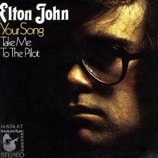 Your Song by Elton John is a ballad composed and performed by English musician Elton John with lyrics by his longtime collaborator, Bernie Taupin. It originally appeared on John’s self-titled second album (1970).
Your Song by Elton John is a ballad composed and performed by English musician Elton John with lyrics by his longtime collaborator, Bernie Taupin. It originally appeared on John’s self-titled second album (1970).
The song was released in the United States in October 1970 as the B-side to “Take Me to the Pilot”. Both received airplay, but “Your Song” was preferred by disc jockeys and replaced “Take Me to the Pilot” as the A-side, eventually making the top ten in several countries.
The Love You Save by the Jackson Five
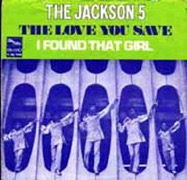 The Love You Save by the Jackson Five is a 1970 number-one hit single recorded by The Jackson 5 for Motown Records. It held the number-one spot on the soul singles chart for six weeks and the number-one position on the Billboard Hot 100 singles chart for two weeks, from June 27 to July 4, 1970 (in the UK Top 40 chart, it peaked at number 7 in August 1970). The song is the third of four Jackson 5 number ones released in a row (the others were “I Want You Back”, “ABC”, and “I’ll Be There”). Billboard ranked the record as the No. 16 song of 1970, one slot behind the Jackson 5’s “ABC”.
The Love You Save by the Jackson Five is a 1970 number-one hit single recorded by The Jackson 5 for Motown Records. It held the number-one spot on the soul singles chart for six weeks and the number-one position on the Billboard Hot 100 singles chart for two weeks, from June 27 to July 4, 1970 (in the UK Top 40 chart, it peaked at number 7 in August 1970). The song is the third of four Jackson 5 number ones released in a row (the others were “I Want You Back”, “ABC”, and “I’ll Be There”). Billboard ranked the record as the No. 16 song of 1970, one slot behind the Jackson 5’s “ABC”. Joy to the World by Three Dog Night
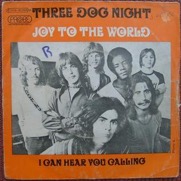 Joy to the World by Three Dog Night is a song written by Hoyt Axton, and made famous by the band Three Dog Night. The song is also popularly known by its opening lyric, “Jeremiah was a bullfrog”. Three Dog Night originally released the song on their fourth studio album, Naturally in November 1970 and subsequently released an edited version of the song as a single in February 1971.
Joy to the World by Three Dog Night is a song written by Hoyt Axton, and made famous by the band Three Dog Night. The song is also popularly known by its opening lyric, “Jeremiah was a bullfrog”. Three Dog Night originally released the song on their fourth studio album, Naturally in November 1970 and subsequently released an edited version of the song as a single in February 1971.
The song, which has been described by members of Three Dog Night as a “kid’s song” and a “silly song”, topped the main singles charts in North America, was certified gold by the RIAA, and has since been covered by multiple artists.
Rose Garden by Lynn Anderson
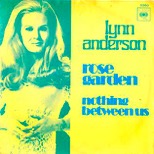 Rose Garden by Lynn Anderson is a song written by Joe South, best known as recorded by country music singer Lynn Anderson, and first released by Billy Joe Royal in 1967. Her October 1970 release topped the U.S. Billboard country chart for five weeks, reached No. 3 on the U.S. Billboard Hot 100 pop chart, and hit number one on both Cash Box’s and Record World’s pop and country singles charts. The song was also a major pop hit internationally, topping the charts in Australia, Canada, New Zealand, Ireland, and Norway, and reaching the top three in the UK and South Africa.
Rose Garden by Lynn Anderson is a song written by Joe South, best known as recorded by country music singer Lynn Anderson, and first released by Billy Joe Royal in 1967. Her October 1970 release topped the U.S. Billboard country chart for five weeks, reached No. 3 on the U.S. Billboard Hot 100 pop chart, and hit number one on both Cash Box’s and Record World’s pop and country singles charts. The song was also a major pop hit internationally, topping the charts in Australia, Canada, New Zealand, Ireland, and Norway, and reaching the top three in the UK and South Africa.
Anderson’s version of “Rose Garden” remains one of the most successful country crossover recordings of all-time.
Take Me Home Country Roads by John Denver
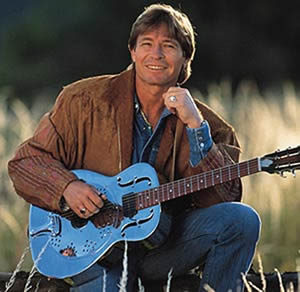 Take Me Home Country Roads by John Denver is a song written by Bill Danoff, Taffy Nivert and John Denver.
Take Me Home Country Roads by John Denver is a song written by Bill Danoff, Taffy Nivert and John Denver.
The song was a success on its initial release and was certified Gold by the RIAA on August 18, 1971 and Platinum on April 10, 2017.[2] The song became one of John Denver’s most popular and beloved songs, and is still very popular around the world. It has continued to sell, with over a million digital copies sold in the United States. It is considered to be Denver’s signature song.
The song also has a prominent status as an iconic symbol of West Virginia, which it describes as “almost Heaven”; for example, it was played at the funeral memorial for U.S. Senator Robert Byrd in July 2010. In March 2014, it became one of several official state anthems of West Virginia.
(Bang a Gong) Get It On by T. Rex
One Bad Apple by The Osmonds
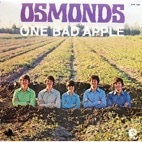 One Bad Apple by The Osmonds was a number-one hit single released by The Osmonds on November 14, 1970. It debuted on the Billboard Hot 100 on January 2, 1971. It hit the top of the chart on February 13, 1971 and stayed there for five weeks. It also reached number six on the R&B chart.
One Bad Apple by The Osmonds was a number-one hit single released by The Osmonds on November 14, 1970. It debuted on the Billboard Hot 100 on January 2, 1971. It hit the top of the chart on February 13, 1971 and stayed there for five weeks. It also reached number six on the R&B chart.
Billboard ranked it as the No. 4 song for 1971. Both “One Bad Apple” and the Donny Osmond-credited single “Sweet and Innocent” are on the 1970 album Osmonds. It was certified Gold by the RIAA on February 4, 1971.
Won’t Get Fooled Again by The Who
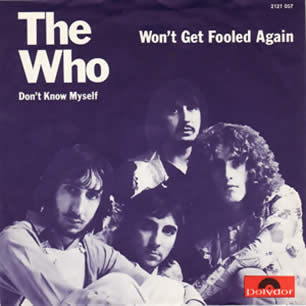 Won’t Get Fooled Again by The Who ” is a song by the English rock band The Who, written by Pete Townshend. It was released as a single in June 1971, reaching the top 10 in the UK, while the full eight-and-a-half-minute version appears as the final track on the band’s 1971 album Who’s Next, released that August.
Won’t Get Fooled Again by The Who ” is a song by the English rock band The Who, written by Pete Townshend. It was released as a single in June 1971, reaching the top 10 in the UK, while the full eight-and-a-half-minute version appears as the final track on the band’s 1971 album Who’s Next, released that August.
Townshend wrote the song as a closing number of the Lifehouse project, and the lyrics criticise revolution and power. To symbolise the spiritual connection he had found in music via the works of Meher Baba and Inayat Khan, he programmed a mixture of human traits into a synthesizer and used it as the main backing instrument throughout the song. The Who tried recording the song in New York in March 1971, but re-recorded a superior take at Stargroves the next month using the synthesizer from Townshend’s original demo.
Ultimately, Lifehouse as a project was abandoned in favour of Who’s Next, a straightforward album, where it also became the closing track. It has been performed as a staple of the band’s setlist since 1971, often as the set closer, and was the last song drummer Keith Moon played live with the band
